

I already went over this in Revelation One but better touch on it again.
There are many studies out there explaining these churches as seven periods of time.
Which may be true, but I believe there is another application that is not talked about enough.
These churches have an end time message.
- Ephesus - Or else I will come unto thee quickly.
- Smyrna - Ye shall have tribulation ten days: be thou faithful unto death, and I will give thee a crown of life.
- Pergamum - Repent; or else I will come unto thee quickly.
- Thyatira - I will cast her into a bed, and them that commit adultery with her into great tribulation....Hold fast till I come.
- Sardis - If therefore thou shalt not watch, I will come on thee as a thief, and thou shalt not know what hour I will come upon thee.
- Philadelphia - Behold, I come quickly: hold that fast which thou hast, that no man take thy crown.
- Laodicea - I know thy works, that thou art neither cold nor hot: I would thou wert cold or hot.
These churches are especially for all of us in the last days.
That will be my focus on these churches.
The book of Daniel is unsealed in the revelation to John, and carries us forward to the last scenes of this earth's history. {TM 115.3}
The names of the seven churches are symbolic of the church in different periods of the Christian Era. The number 7 indicates completeness, and is symbolic of the fact that the messages extend to the end of time, while the symbols used reveal the condition of the church at different periods in the history of the world. {AA 585.3}
- The messages extend to the end of time.
- The symbols used reveal the condition of the church.
Yes you can argue that this quote means we can only apply these conditions for a certain time period.
But you can also argue that all seven conditions can apply to each time period.
Which to me better describes how Ellen White applied them.
The messages to the church of Ephesus and to the church in Sardis have been often repeated to me by the One who gives me instruction for His people. {8T 99.1}
Then after quoting both churches she goes on to say....
We are seeing the fulfillment of these warnings. Never have scriptures been more strictly fulfilled than these have been. {8T 99.1}
This to me points to the future not the past.
Unto the angel of the church of Ephesus write; These things saith he that holdeth the seven stars in his right hand, who walketh in the midst of the seven golden candlesticks;
I know thy works, and thy labour, and thy patience, and how thou canst not bear them which are evil: and thou hast tried them which say they are apostles, and are not, and hast found them liars:
And hast borne, and hast patience, and for my name's sake hast laboured, and hast not fainted.
Nevertheless I have somewhat against thee, because thou hast left thy first love.
Remember therefore from whence thou art fallen, and repent, and do the first works; or else I will come unto thee quickly, and will remove thy candlestick out of his place, except thou repent.
But this thou hast, that thou hatest the deeds of the Nicolaitans, which I also hate.
He that hath an ear, let him hear what the Spirit saith unto the churches; To him that overcometh will I give to eat of the tree of life, which is in the midst of the paradise of God.
We are seeing the fulfillment of these warnings. Never have scriptures been more strictly fulfilled than these have been. {8T 99.1}
Christ is spoken of as walking in the midst of the golden candlesticks. Thus is symbolized His relation to the churches. He is in constant communication with His people. He knows their true state. He observes their order, their piety, their devotion. Although He is high priest and mediator in the sanctuary above, yet He is represented as walking up and down in the midst of His churches on the earth. With untiring wakefulness and unremitting vigilance, He watches to see whether the light of any of His sentinels is burning dim or going out. If the candlesticks were left to mere human care, the flickering flame would languish and die; but He is the true watchman in the Lord's house, the true warden of the temple courts. His continued care and sustaining grace are the source of life and light. {AA 586.1}
Rev 2:2 "I know thy works"
-This is said to all seven churches.
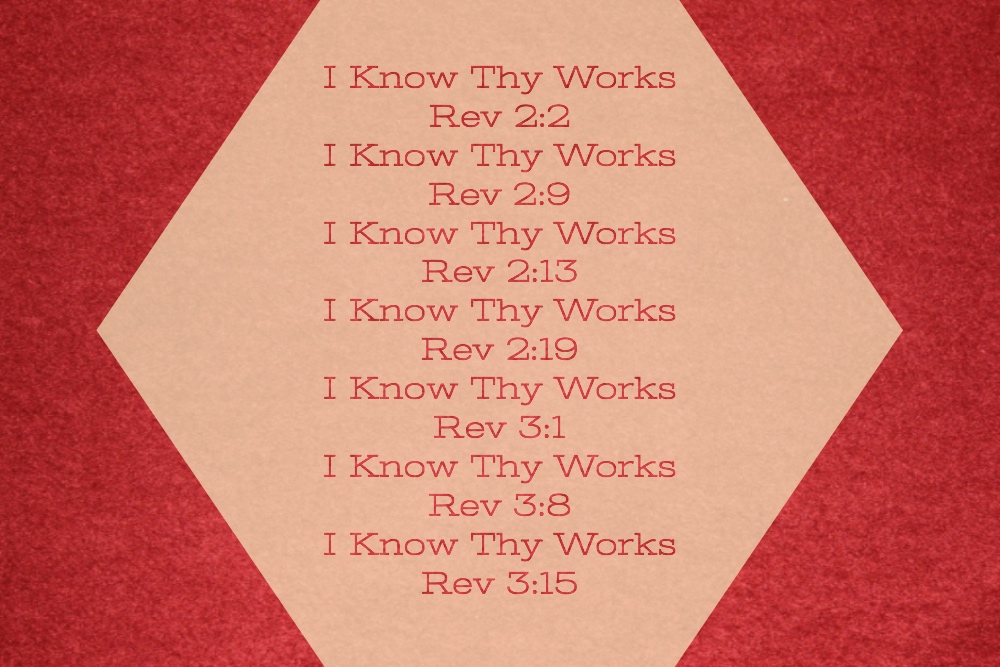
Silence the evil word; put away the unholy thought, for the True Witness weighs every word, sets a value on every action, and declares, "I know thy works." [AH 438.2}
We are living in the sight of a holy God, who solemnly declares, "I know thy works." The divine eye is ever upon us. We cannot cover one act of unjust deal from God. {CG 152.2}
Every act, every word, every motive, is faithfully chronicled in the records of the great Heart-searcher, who said, 'I know thy works.' {LS 322.3}
You cannot deceive God. Says the True Witness, "I know thy works." The third angel is leading up a people, step by step, higher and higher. At every step they will be tested. {2SG 229.1}
It is all written in heaven. "I know thy works." {2SG 235.1}
Rev 2:2 "I know thy works, and thy labour, and thy patience"
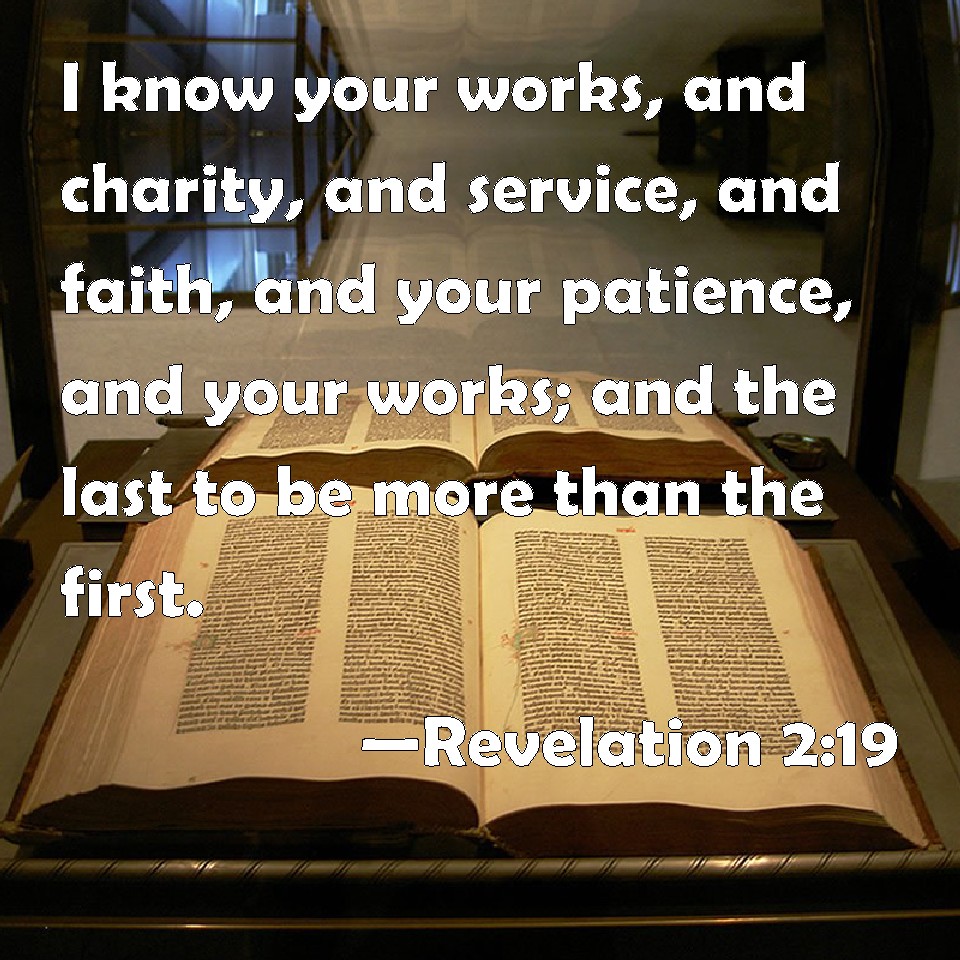
God has selected a people in these last days whom He has made the depositaries of His law, and this people will ever have disagreeable tasks to perform. "I know thy works, and thy labour, and thy patience"...{LHU 310.2}
I know thy works, and thy labour, and thy patience." Christ is acquainted with the history and experience of every one who has accepted Him. To His people He says, "I have graven thee upon the palms of my hands." {LHU 318.5}
The church may meet all the description that is given of the Ephesian church, and yet fail in vital godliness. Of them Jesus said, "I know thy works, and thy labour and thy patience,... {5MR 52.2}
Rev 2:2 "Thou canst not bear them which are evil."
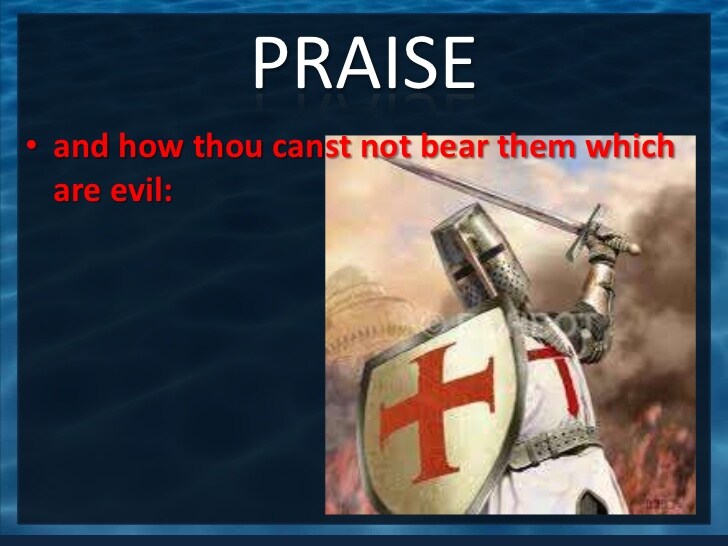
Here we see a deep, heart-felt, prolonged struggle; just such a struggle as we might have expected in these last days of conflict. "Thou canst not bear them which are evil." Rigid and impartial discipline was exercised in the case of all unworthy disciples and false teachers who were bringing in damnable heresies, which were undermining the foundation of the faith. {RH May 31, 1887, par. 3}
Thou hast borne and had patience. The faithful minister is commended in having zeal against that which is evil. Not only will he not practice evil himself, but he will be an example to believers in his piety, his purity, his godliness, and his devotion to sacred things. "Thou canst not bear them which are evil." His affections will not fasten upon and cling to the evil doer. He hates the practices of the worker of iniquity. While every effort should be made for the salvation of these souls, in all meekness and wisdom, there must be manifested a zeal to repress evil, to counteract its baleful influence. God will not justify any one in making light of sin, and showing preference to the evil-worker. {RH May 31, 1887, par. 18}
"Well done, good and faithful servants." They are commended because they have toiled early and late, and because they cannot bear them which are evil. They have carried out the injunction of the apostle to "reprove, rebuke, exhort with all long-suffering and doctrine." They have administered impartial discipline, laying their hand upon all false teaching, upon false brethren whose works have denied the faith. Amid the scorn of men, suffering worldly loss, they have manifested steadfast integrity. While temptations to worldliness and licentiousness cause the love of many to wax cold, they stand true as the needle to the pole, as faithful workers, as standard-bearers for God, in principle firm as a rock. {RH January 21, 1890, par. 3}
"And how thou canst not bear them which are evil: and thou hast tried them which say they are apostles, and are not, and hast found them liars." While we should not find fault and accuse, we should never give encouragement to evil. There are those who are vain talkers. Their influence is misleading. Unless they repent, they will be weighed in the balances, and found wanting. Faithful reproof may save them. {RH May 26, 1903, par. 6}
Rev 2:2 "Thou hast tried them which say they are apostles, and are not, and hast found them liars."

"Thou hast tried them which say they are apostles, and are not, and hast found them liars." There will be men who claim to have a work to do in preaching the truth to others, and it may be found best to test them. But the most solemn obligation is laid upon those who consent to do this, to watch their going out and their coming in, to follow on their track to closely investigate the manner in which their work is done; whether they are indeed leaving a savory influence, or an influence which belies all their pretensions to be apostles of Jesus Christ. True zeal, Christ-like zeal, is to be shown in every case, that pretenders may not obtain a foot-hold, and through deception insinuate themselves into the confidence of the churches when they are not worthy of the confidence of Christians, because their works are evil, their hearts unsanctified, their actions defiling. {RH May 31, 1887, par. 19}
"I know thy works, and thy labor, and thy patience, and how thou canst not bear them which are evil: and thou hast tried them which say they are apostles, and are not, and hast found them liars." This labor of purifying the church is a painful work, but one that must not be neglected, if the church would have the commendation of God. But repent, because thou hast left thy first love. Here is plainly presented before us our work as members of the church of Christ. If we are faithless, we shall lose the crown of life and another will take it; for in the dropping out of the faithless the places are supplied by the faithful. If we refuse to let our light shine for the Master, if we do not do the works of God, others will do that very work which we might have done and could have done, but refused to do. When we cease to fulfill our mission, when the candlestick refuses to reflect light, and the great truths committed to us individually in trust for the world, are not given to them, then the candlestick will be removed. "I will come unto thee quickly, and will remove thy candlestick out of his place." Another will be placed in his stead and will shine. Let prayer be ascending now without delay to Him who walketh in the midst of the golden candlesticks. Take not thy Holy Spirit from us. "Purge me with hyssop, and I shall be clean: wash me, and I shall be whiter than snow.... Create in me a clean heart, O God; and renew a right spirit within me. Cast me not away from thy presence; and take not thy Holy Spirit from me. Restore unto me the joy of thy salvation; and uphold me with thy free Spirit. Then will I teach transgressors thy ways: and sinners shall be converted unto thee." {RH June 7, 1887, par. 17}
"And thou hast tried them which say they are apostles, and are not, and hast found them liars." [Verse 2.] There are those who are vain talkers. Their mouths need to be stopped. Their influence is misleading. When their pretensions are examined, they will be weighed in the balances and found wanting. Then faithful reproof may save them. {Ms78-1900.10}"
Rev 2:3 "And hast borne, and hast patience, and for my name's sake hast laboured, and hast not fainted."
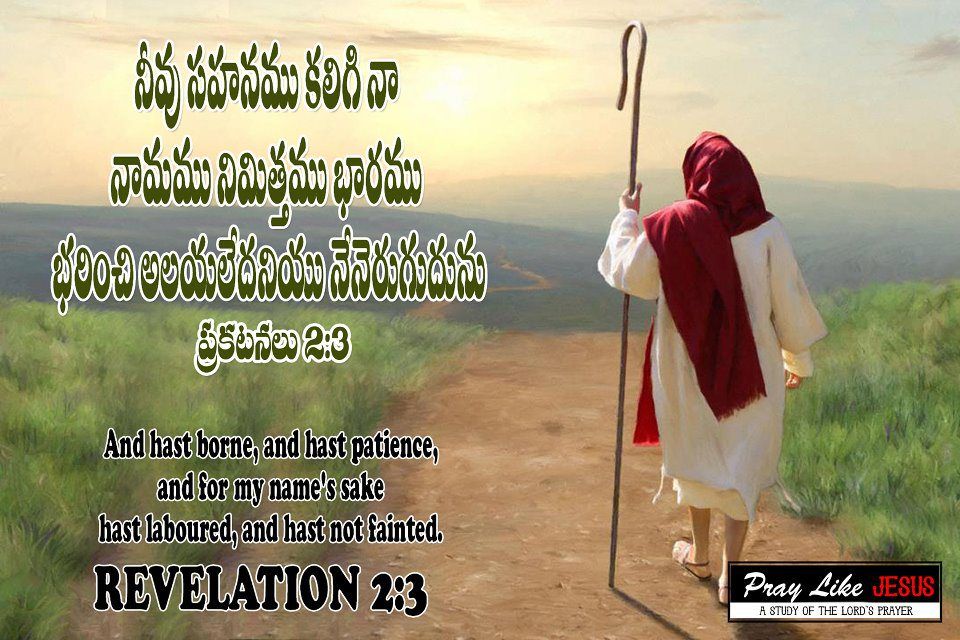
Will He pronounce the commendation upon the workers, "I know thy works, and thy labour, and thy patience," and how thou "hast borne, and hast patience, and for My name's sake hast laboured, and hast not fainted"? {WM 155.1}
The Lord looks with approval upon the works of his faithful servants. He says of the church of Ephesus, "I know thy works, and thy labor, and thy patience;" for my name's sake thou "hast labored, and hast not fainted." But while he takes account of faithful service, he is no less exact to mark neglect of duty or its unwilling performance. It has always been the duty of God's chosen people to labor unselfishly; but some neglect the work they ought to do, and others are overburdened to make up for their deficiencies. If all would cheerfully do their part, they would be sustained; but those who complain and murmur at every step will receive neither help nor reward. {ST June 12, 1884, par. 2}
Rev 2:4 "Nevertheless I have somewhat against thee, because thou hast left thy first love."

But in spite of these good works, the leaving of their first love made their efforts unacceptable to God. {18MR 188.3}
The word, "Nevertheless I have somewhat against thee, because thou hast left thy first love," is applicable to many living in this time. God calls for immediate repentance and reformation. It is time for a great change to take place among the people who are looking for the second appearing of their Lord. Soon strange things will take place. God will hold us responsible for the way in which we treat the truth. Our purity of faith and action will decide our future. {MM 37.5}
"Thou hast left thy first love." Is not this our case? Our doctrines may be correct; we may hate false doctrine, and may not receive those who are not true to principle; we may labor with untiring energy; but even this is not sufficient. What is our motive? Why are we called upon to repent?-"Thou hast left thy first love." {1SM 370.2}
"Nevertheless I have somewhat against thee, because thou hast left thy first love." Thine is a decay, a declension in holy zeal-not forsaken is the object of it, but lost is the fervor. The first affection of the convert to Christ is deep, full, and ardent. It is not necessary that this love should become less as knowledge increases, as the more and increased light shines upon him. That love should become more fervent as he becomes better acquainted with his Lord.... {7BC 956.8} God will accept nothing less than the whole heart. Happy are they who from the commencement of their religious life have been true to their first love, growing in grace and the knowledge of our Lord Jesus Christ. The sure result of their intercourse and fellowship with their beloved Lord will be to increase their piety, their purity, their fervor. They are receiving a divine education, and this is illustrated in a life of fervor, of diligence and zeal.... {7BC 956.9} It is our work to know our special failings and sins, which cause darkness and spiritual feebleness, and quenched our first love (The Review and Herald, June 7, 1887). {7BC 957.1}
We need Jesus every moment. To lose His love from our hearts means much. Yet He Himself says: "I have somewhat against thee, because thou hast left thy first love." ... {RC 77.2}
I have been instructed in regard to the danger of drawing apart. Let us leave to Satan and his agents the cruel work of accusing and fault-finding. Our work is to repent before God because of our unbelief and want of love for Him who died for us and for one another. The gold of love and faith is wanting in our ranks. Christ declares, "Nevertheless, I have somewhat against thee, because thou hast left thy first love" [Revelation 2:4]. {13MR 332.3}
Rev 2:5 "Remember therefore from whence thou art fallen, and repent, and do the first works; or else I will come unto thee quickly, and will remove thy candlestick out of his place, except thou repent."
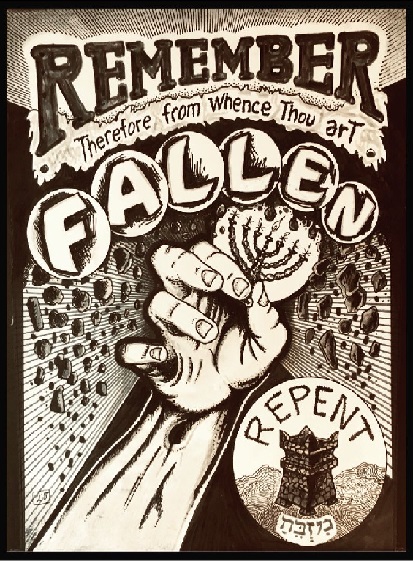
And He says, "Except thou repent," "I will come unto thee quickly, and will remove thy candlestick out of his place" (Revelation 2:5). Why?-Because in our separation from one another we are separated from Christ. We want to press together. Oh, how many times, when I have seemed to be in the presence of God and holy angels, I have heard the angel voice saying, "Press together, press together, press together. Do not let Satan cast his hellish shadow between brethren. Press together; in unity there is strength." {2SM 374.2}
We have a message of warning to the church. God says to you, "Be zealous and repent." "I will come unto thee quickly, and will remove thy candlestick out of his place, except thou repent." Precious time has been squandered in which you might have won souls to Christ,-souls that through your love of ease are now lost. Every member of the church should awake to duty now. May God help you to take on the burden. Let the church-members pray and fast and believe. Let the hearts of parents be turned to their children, and the hearts of children to their parents, "Lest I come," saith the Lord, "and smite the earth with a curse." Your souls are in peril. Shall the Sun of Righteousness set, and leave you enshrouded in the darkness of eternal night? {HS 286.6}
I counsel this church to give heed to the Saviour's admonition: "Remember therefore from whence thou art fallen, and repent, and do the first works; or else I will come unto thee quickly, and will remove thy candlestick out of his place, except thou repent." {5T 191.1}
Rev 2:6 "But this thou hast, that thou hatest the deeds of the Nicolaitans, which I also hate."

"Think not that I am come to destroy the Law or the prophets; I am not come to destroy, but to fulfil." The death of Christ justified the claims of the law.
But the doctrine is now largely taught that the Gospel of Christ has made the Law of God of no effect; that by "believing" we are released from the necessity of being doers of the word. But this is the doctrine of the Nicolaitans, which Christ so unsparingly condemned. {ST February 25, 1897}
Rev 2:7 "He that hath an ear, let him hear what the Spirit saith unto the churches; To him that overcometh will I give to eat of the tree of life, which is in the midst of the paradise of God."

And to all the faithful ones who were striving against evil, John heard the promises made: "To him that overcometh will I give to eat of the tree of life, which is in the midst of the Paradise of God." "He that overcometh, the same shall be clothed in white raiment; and I will not blot out his name out of the book of life, but I will confess his name before My Father, and before His angels." "To him that overcometh will I grant to sit with Me in My throne, even as I also overcame, and am set down with My Father in His throne." Verse 7; 3:5, 21. {AA 588.2} John saw the mercy, the tenderness, and the love of God blending with His holiness, justice, and power. He saw sinners finding a Father in Him of whom their sins had made them afraid. And looking beyond the culmination of the great conflict, he beheld upon Zion "them that had gotten the victory ... stand on the sea of glass, having the harps of God," and singing "the song of Moses" and the Lamb. Revelation 15:2, 3. {AA 589.1}
The Lord will soon come and take the good and holy to himself. We want you to live among the pure and holy angels in heaven, and wear a crown of gold, and eat of the tree of life. {AY 41.1}
John heard the promises: "To him that overcometh will I give to eat of the tree of life." "I will not blot out his name out of the book of life, but I will confess his name before My Father, and before His angels." I will "grant [him] to sit with Me in My throne." Revelation 2:7; 3:5, 21. John saw sinners finding a Father in Him of whom their sins had made them afraid. {TT 308.1}